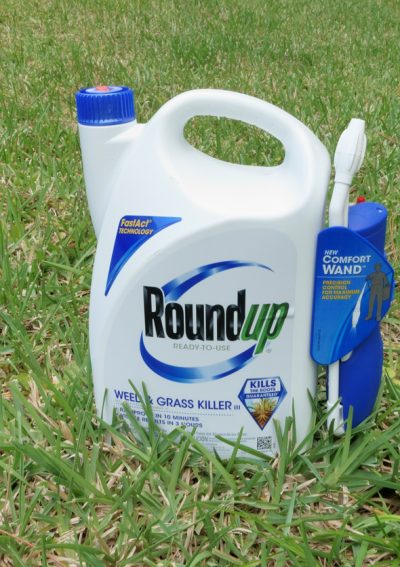Is Roundup Safe?
Is Roundup safe? The EPA and WHO disagree. The weed killer contains glyphosate and research has shown potential associations between high levels of glyphosate exposure and non-Hodgkin lymphoma. Evidence also shows exposure to large amounts of Roundup may be harmful to pets.

Roundup Safety
Risks associated with Roundup use are tied to its active ingredient, glyphosate. The EPA classifies Roundup as “safe for use,” but the International Agency for Cancer Research, an arm of The World Health Agency, classifies glyphosate as a “probable human carcinogen.”
Some studies indicate glyphosate increases the risk of developing non-Hodgkin lymphoma among people with long-term exposure. Research also shows that long-term, high-level glyphosate exposure may impact developing fetuses in pregnant women and may be damaging to a healthy gut microbiome. These healthy bacteria in our intestines play a key role in regulating body-wide health.
Glyphosate exposure can have negative short-term side effects. The chemical can irritate the skin it touches. Brief periods of breathing in glyphosate may cause nose and throat irritation and asthma symptoms. Ingesting glyphosate causes burns in the mouth and throat, nausea, vomiting and diarrhea; consuming very large amounts of glyphosate can be fatal.
EPA Decision on Roundup
The EPA reviewed glyphosate data concerning human health and ecological risk in 2009 and 2015 and published its glyphosate findings in 2017. After reviewing public comments on the findings, the EPA published a temporary interim registration review decision in 2020 and says it will issue a final registration review decision on the safety of glyphosate.
Once the EPA issues its decision, products containing glyphosate will need to carry a new safety label. In the U.S., glyphosate has been a registered pesticide since 1974, and the EPA has periodically reevaluated safety data on the chemical since then.
The EPA has historically determined that the glyphosate-containing pesticide Roundup is safe to use when following the label directions and that glyphosate is unlikely to be a human carcinogen. Despite increasing public concern over glyphosate safety and ongoing reevaluation of glyphosate research, the EPA has maintained that glyphosate is safe when users follow the label directions.
Glyphosate Regulations
The U.S. Food and Drug Administration ensures pesticide residue on food crops doesn’t exceed the EPA’s safety limits. The EPA evaluates a pesticide to ensure it’s safe for human health when used according to label directions and sets a tolerance level based on that evaluation.
The EPA sets a tolerance level for any pesticide that growers use on food crops consumed in the U.S., including corn, soy and grains. The FDA then tests crops to ensure they don’t contain pesticide residue levels greater than set tolerance levels.
While the U.S. has no national glyphosate ban, some states and municipalities restrict its use. Globally, countries prohibiting glyphosate-based products include Germany and Saudi Arabia.
Roundup Lawsuits
Bayer has faced Roundup lawsuits claiming glyphosate exposure caused their diagnoses of non-Hodgkin lymphoma. Bayer has agreed to pay billions of dollars to plaintiffs and Courts have combined thousands of cases into multidistrict litigation.
In response to this litigation, Bayer has said it will remove Roundup products from the U.S. residential market in 2023. Bayer continues to sell Roundup products, however, as of summer 2023 and without a cancer risk warning label. The broad-spectrum pesticide used to kill weeds in food crops, public spaces and residential gardens remains popular with consumers.
Is Roundup Safe For Pets?
Dogs spend time outdoors in close contact with grass and plants and may be at risk of exposure to recently applied Roundup. Cats that go outdoors can have similar high exposure levels. When pets lick their fur they can ingest glyphosate.
Some vets advise pet owners against using chemical pesticides, but pet owners who do use Roundup should keep pets off grass for 48 hours after application. Owners should also avoid walking dogs on uniform, weedless grass because this grass likely has had chemical pesticide or herbicide treatments.
Dr. Lauren Trepanier of the University of Wisconsin-Madison School of Veterinary Medicine found that weed killer chemicals were present in most of the dogs she tested for pesticide exposure, and many had very high levels. Pets are smaller than humans, meaning they’re more vulnerable to “ground-level toxins,” said U.S. Humane Society veterinarian Dr. Barbara Hodges.
Pets can also become sick after ingesting glyphosate. Ingesting a small amount of glyphosate may lead to nausea, vomiting or diarrhea. Consuming larger amounts can cause drooling, lethargy or even death. Roundup may also cause skin irritation, itching or swelling of a pet’s nose, eyes or paws.
Is Roundup Safe For Lawns?
Roundup’s main ingredient is a nonselective herbicide that damages or kills any plant it touches, including ornamental species. Effective at killing weeds, glyphosate can also kill the grass around weeds and may damage lawns.
When sprayed, it can also drift to other areas and damage plants or grass. Bayer is currently still selling glyphosate products in 2023, but the company has also introduced a new product: Roundup for Lawns. Roundup for Lawns contains other chemical herbicides instead of glyphosate, including dicamba.
Safer alternatives to Roundup include iron- and vinegar-based herbicide sprays, soap salts, manual mulching and integrated weed management techniques. Roundup alternatives work best in combination because different methods affect various growing stages of weeds. Integrated weed management techniques combine different methods and are most effective over multiple years and growing cycles.
11 Cited Research Articles
Consumernotice.org adheres to the highest ethical standards for content production and references only credible sources of information, including government reports, interviews with experts, highly regarded nonprofit organizations, peer-reviewed journals, court records and academic organizations. You can learn more about our dedication to relevance, accuracy and transparency by reading our editorial policy.
- Adams, B.W. (2023, March 31). Dogs, lawn care and cancer. Retrieved from https://www.humanesociety.org/news/dogs-lawn-care-and-cancer
- Wallace, J. & Lingenfelter, D. (2023, January 5). Glyphosate (Roundup): Understanding Risks to Human Health. Retrieved from https://extension.psu.edu/glyphosate-roundup-understanding-risks-to-human-health
- U.S. Food & Drug Administration. (2022, February 28). Questions and Answers on Glyphosate. Retrieved from https://www.fda.gov/food/pesticides/questions-and-answers-glyphosate
- Weisenburger, D.D. (2021, September 21). A Review and Update with Perspective of Evidence that the Herbicide Glyphosate (Roundup) is a Cause of Non-Hodgkin Lymphoma. Retrieved from https://pubmed.ncbi.nlm.nih.gov/34052177/
- Bayer. (2021, July 29). Bayer Provides Update on Path to Closure of Roundup Litigation. Retrieved from https://www.bayer.com/media/en-us/bayer-provides-update-on-path-to-closure-of-rounduptm-litigation/
- Pu, Y. et al. (2020, March 30). Maternal glyphosate exposure causes autism-like behaviors in offspring through increased expression of soluble epoxide hydrolase. Retrieved from https://www.pnas.org/doi/full/10.1073/pnas.1922287117
- Charles, D. (2019, May 30). Safe Or Scary? The Shifting Reputation Of Glyphosate, AKA Roundup. Retrieved from https://www.npr.org/sections/thesalt/2019/05/30/727914874/safe-or-scary-the-shifting-reputation-of-glyphosate-aka-roundup
- Henderson, A.M. et al. (2019, March). Glyphosate General Fact Sheet. Retrieved from http://npic.orst.edu/factsheets/glyphogen.html
- Mao, Q. et al. (2018, May 29). The Ramazzini Institute 13-week pilot study on glyphosate and Roundup administered at human-equivalent dose to Sprague Dawley rats: effects on the microbiome. Retrieved from https://pubmed.ncbi.nlm.nih.gov/29843725/
- Frank, K. & Hathaway, A. (2017, March 31). What’s the difference between Roundup and Roundup for Lawns? Retrieved from https://www.canr.msu.edu/news/difference_between_roundup_and_roundup_for_lawns
- Hommerding, H. (n.d.). The Grass Is Always Greener: Common Fertilizer and Herbicide Exposure in Pets. Retrieved from https://www.petpoisonhelpline.com/blog/grass-always-greener-common-fertilizer-herbicide-exposures-pets/
Calling this number connects you with a Consumer Notice, LLC representative. We will direct you to one of our trusted legal partners for a free case review.
Consumer Notice, LLC's trusted legal partners support the organization's mission to keep people safe from dangerous drugs and medical devices. For more information, visit our partners page.
855-605-1792
